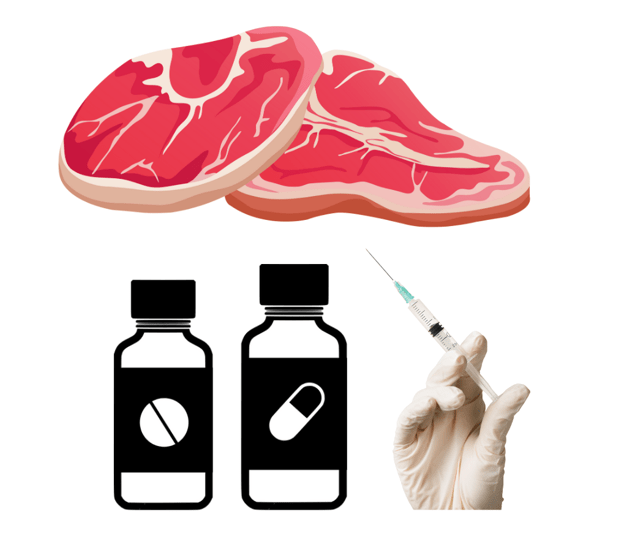 General Info
General Info
Understanding the Impact of Meat with Antibiotic Residues
Meat that has been produced from animals treated with antibiotics is commonly referred to as “meat with antibiotic residues.” Antibiotics are sometimes used in animal agriculture to prevent or treat bacterial infections in livestock. However, the use of antibiotics in food-producing animals can lead to the presence of residual antibiotic substances in the meat.
…
…
Antibiotic Resistance and Consumer Safety
…………………………….
…………………………….
……………………
.
.
Consuming meat with antibiotic residues does not necessarily mean that you will directly ingest antibiotics or experience any immediate health effects. However, there are concerns regarding the long-term consequences of consuming such meat. The main concern is the potential development of antibiotic resistance in bacteria.


……………………………………………………………………………………………………………………………………………………………………………………………………………………..
When antibiotics are used in animals, there is a risk that bacteria present in the animals may become resistant to those antibiotics. If these antibiotic-resistant bacteria are consumed through meat or other food products, they can potentially cause infections that are difficult to treat with common antibiotics. This is a significant public health concern, as it reduces the effectiveness of antibiotics in treating human infections.
To mitigate the risks associated with antibiotic-resistant bacteria, regulatory bodies in many countries have established maximum residue limits (MRLs) for antibiotics in meat products. These limits ensure that the levels of antibiotic residues in meat are within safe ranges for human consumption. The meat industry is also encouraged to follow withdrawal periods, which are the recommended time periods between the last antibiotic treatment and the slaughter of the animal. This allows time for the antibiotics to be metabolized and eliminated from the animal’s system.
To ensure you are consuming meat that meets safety standards, it is advisable to purchase meat from reputable sources that adhere to regulatory guidelines and prioritize responsible antibiotic use in animal production. Additionally, cooking meat thoroughly can help reduce the risk of bacterial contamination. If you have specific concerns about antibiotic residues in meat, it is best to consult with healthcare professionals or regulatory authorities in your country for the most up-to-date and accurate information.
“Promoting Healthier Meat Production: Alternatives to Antibiotics for Sustainable Animal Health”
There are several alternatives and practices used in the production of healthier meat without relying heavily on antibiotics. Here are a few examples:
- Vaccination: Vaccinating animals against common diseases can help prevent the need for antibiotics in the first place. Vaccines can boost the immune system of animals, reducing the risk of infections and the need for antibiotic treatment.
- Improved hygiene and sanitation: Maintaining clean and hygienic conditions in animal housing facilities, as well as implementing strict biosecurity measures, can help minimize the spread of diseases and reduce the need for antibiotics.
- Nutritional management: Providing animals with a balanced and nutritious diet helps strengthen their immune system, making them more resilient to diseases. Proper nutrition can also contribute to overall animal health and reduce the need for antibiotics.
- Probiotics and prebiotics: Probiotics are beneficial bacteria, while prebiotics are substances that promote the growth of beneficial bacteria in the animal’s gut. These can be used as alternatives to antibiotics to promote a healthy gut microbiome and support animal health.
- Herbal and plant-based remedies: Some plant extracts and essential oils have shown potential antimicrobial properties and can be used as natural alternatives to antibiotics. However, more research is needed to determine their efficacy and proper usage.
- Genetic selection: Breeding animals for disease resistance can help reduce the occurrence of illnesses and the need for antibiotics. Selective breeding programs aim to improve the overall health and resistance of animals to specific diseases.

It’s important to note that the effectiveness of these alternatives may vary depending on the specific circumstances, animal species, and farming practices. Their implementation often requires a holistic approach and close collaboration between farmers, veterinarians, and researchers to ensure the best results in promoting animal health and welfare.

XVET’s Aromax Dry is a unique natural botanical product specifically designed for the support of respiratory and digestive health of livestock animals. The product has a high content of the natural essential oils from Eucalyptus, Mint and Thyme as main ingredients, plus pure L-menthol.
It can be positioned for the enhancement of appetite of animals at all ages, improvement of FCR, promotes a beneficial gut microbiome, and supports the respiratory as well as the digestive tract of young calves in times of challenges during their rearing phase (low temperatures, high relative humidity…).
For further details, please contact us via technical@xvetgermany.com.
Sources:
- Alternatives to Antibiotics: A Symposium on the Challenges and Solutions for Animal Health and Production, Todd R. Callaway, Hyun Lillehoj, Rungtip Chuanchuen, and Cyril G. Gay, 10.3390/antibiotics10050471
- The public health issue of antibiotic residues in food and feed: Causes, consequences, and potential solutions, Mbarga Manga Joseph Arsène, Anyutoulou Kitio Linda Davares, Podoprigora Irina Viktorovna, Smolyakova Larissa Andreevna, Souadkia Sarra, Ibrahim Khelifi, and Das Milana Sergueïevna, 10.14202/vetworld.2022.662-671
- Antibiotic Use in Livestock and Residues in Food—A Public Health Threat: A Review, Oana Mărgărita Ghimpețeanu, Elena Narcisa Pogurschi, Dana Cătălina Popa, Nela Dragomir, Tomița Drăgotoiu, Oana Diana Mihai, and Carmen Daniela Petcu, 10.3390/foods11101430
- Antibiotic residues in cattle and sheep meat and human exposure assessment in southern Xinjiang, China, Yu Zhang, Jianjiang Lu, Yujun Yan, Jinhua Liu, and Manli Wang, 10.1002/fsn3.2568
- Consumo de carne pode reduzir eficácia de medicamentos, https://vegazeta.com.br/consumo-de-carne-pode-reduzir-eficacia-de-medicamentos/









